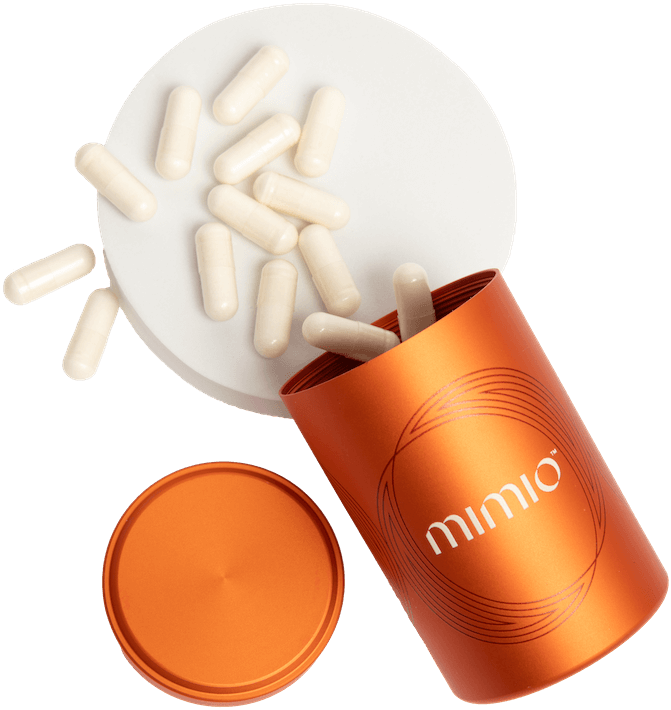Inflammation is a natural and crucial part of the body's defense system. However, when inflammation becomes chronic, it can wreak havoc on our health. Dietary inflammation, caused by certain foods and poor eating habits, is a significant contributor to chronic diseases. But fear not! Understanding how to manage and reduce dietary inflammation can set you on a path to a healthier, happier life. Enter Mimio, your new best friend in this battle.
Understanding Dietary Inflammation
Dietary inflammation occurs when the food we eat triggers an immune response, causing persistent inflammation in the body. This can lead to a host of health issues, including heart disease, diabetes, and even accelerated aging. Common culprits include processed foods, high sugar intake, and unhealthy fats. Here’s how these foods contribute to dietary inflammation:
- Processed Foods: Often high in refined sugars, unhealthy fats, and artificial additives, processed foods can cause a negative inflammatory response¹.
- Sugars: Excessive sugar intake can lead to increased production of inflammatory cytokines².
- Unhealthy Fats: Trans fats and saturated fats found in fried and processed foods are notorious for promoting inflammation³.
But not all is doom and gloom. There are plenty of anti-inflammatory foods that can help you combat this chronic issue.
Anti-Inflammatory Foods to the Rescue
Incorporating anti-inflammatory foods into your diet can help reduce inflammation and improve overall health. Here’s a list to get you started:
- Fruits and Vegetables: Packed with antioxidants, vitamins, and minerals, these plant-based powerhouses help neutralize inflammation. Think berries, leafy greens, and colorful veggies⁴.
- Nuts and Seeds: Rich in omega-3 fatty acids, nuts, and seeds support heart health and reduce inflammation. Walnuts, flaxseeds, and chia seeds are excellent choices⁵.
- Whole Grains: Whole grains like quinoa, brown rice, and oats provide fiber and nutrients that help stabilize blood sugar levels and reduce inflammation⁶.
- Fatty Fish: Salmon, mackerel, and sardines are high in omega-3 fatty acids, which have strong anti-inflammatory effects⁵.
- Herbs and Spices: Turmeric, ginger, and garlic are renowned for their anti-inflammatory properties and can easily be added to your meals⁴.
Enter Mimio: Your Anti-Inflammation Ally
Mimio's Daily Biomimetic Cell Care is designed to help you harness the power of your body's natural regenerative abilities, making it another essential part of your anti-inflammatory strategy. Here's how Mimio supports a healthy lifestyle:
- Mimics Fasting Benefits: Fasting has been shown to reduce inflammation by promoting autophagy, a process where the body cleans out damaged cells and regenerates new ones. Mimio mimics these benefits, even during a meal, helping to keep inflammation in check⁷.
- Enhances Cellular Health: By supporting cellular health, Mimio helps maintain the integrity of your cells, reducing the likelihood of chronic inflammation taking root⁸.
- Boosts Metabolism: A healthy metabolism can help prevent the buildup of inflammatory fat deposits. Mimio enhances your metabolism, making it easier to maintain a healthy weight and reduce inflammation⁷.
- Supports Mood and Energy: Chronic inflammation can lead to fatigue and mood swings. Mimio's formulation supports better energy levels and mood, helping you feel your best⁸.
Tips to Reduce Dietary Inflammation
In addition to incorporating anti-inflammatory foods and using Mimio, here are some practical tips to help you reduce dietary inflammation:
- Stay Hydrated: Drinking plenty of water helps flush out toxins and supports overall health.
- Limit Processed Foods: Aim to eat whole, unprocessed foods as much as possible.
- Balance Your Diet: Ensure you're getting a good mix of macronutrients – proteins, fats, and carbohydrates – from healthy sources.
- Avoid Excessive Alcohol: Limit alcohol consumption as it can contribute to inflammation.
- Exercise Regularly: Physical activity helps reduce inflammation and supports overall health.
A Day in an Anti-Inflammatory Diet
To make things even simpler, here's a sample day of anti-inflammatory eating:
- Breakfast: A bowl of oatmeal topped with fresh berries, a handful of walnuts, and a sprinkle of flaxseeds.
- Lunch: A quinoa salad with mixed greens, cherry tomatoes, cucumber, avocado, and a turmeric vinaigrette.
- Snack: An apple with a handful of almonds.
- Dinner: Grilled salmon with steamed broccoli and sweet potato wedges.
- Before Bed: A cup of chamomile tea with a slice of ginger.
How Mimio Fits into Your Routine
Adding Mimio to your daily routine is easy. Simply take it as directed (two pills a day, every day) to start reaping its benefits. Whether you’re already following an anti-inflammatory diet or just starting to make healthier choices, Mimio can provide that extra boost your body needs.
Internal Link: For more information on how Mimio can support your health, check out Mimio Biomimetic Cell Care.
Conclusion
Chronic dietary inflammation doesn’t have to dictate your health. By making informed food choices and incorporating supportive supplements like Mimio, you can take control of your well-being and reduce inflammation. Remember, a balanced diet rich in anti-inflammatory foods, regular exercise, and staying hydrated are key components of a healthy lifestyle. Here’s to living a vibrant, inflammation-free life!
References
¹ Fardet, A., & Rock, E. (2014). Toward a new philosophy of preventive nutrition: from a reductionist to a holistic paradigm to improve nutritional recommendations. Advances in Nutrition, 5(4), 430-446.
² Calder, P. C. (2017). Omega-3 fatty acids and inflammatory processes: from molecules to man. Biochemical Society Transactions, 45(5), 1105-1115.
³ Levine, B., & Kroemer, G. (2019). Biological Functions of Autophagy Genes: A Disease Perspective. Cell, 176(1-2), 11-42.
⁴ Boeing, H., Bechthold, A., Bub, A., Ellinger, S., Haller, D., Kroke, A., ... & Watzl, B. (2012). Critical review: vegetables and fruit in the prevention of chronic diseases. European Journal of Nutrition, 51(6), 637-663.
⁵ Tighe, P., Duthie, G., Vaughan, N., Brittenden, J., Simpson, W. G., Horgan, G., ... & Thies, F. (2010). Effect of increased consumption of whole-grain foods on blood pressure and other cardiovascular risk markers in healthy middle-aged persons: a randomized controlled trial. The American Journal of Clinical Nutrition, 92(4), 733-740.



